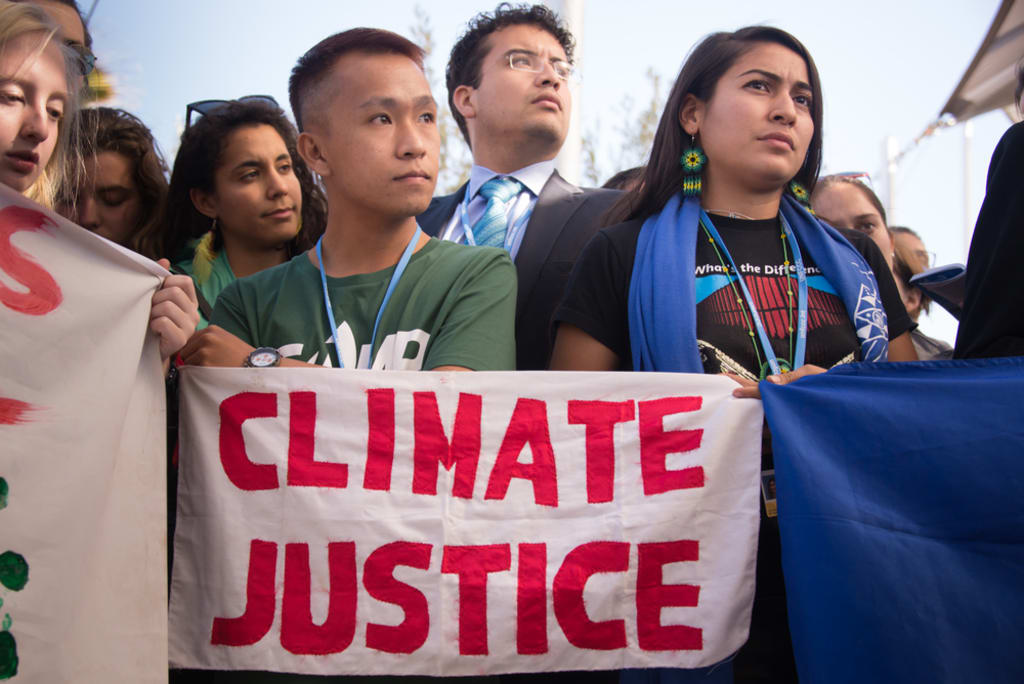CLIMATE JUSTICE: GLOBAL WARMING THREATENS HUMAN RIGHTS
Climate Justice is the name of a movement recognizing the climate crisis as a threat to social justice. Find out why human rights group Amnesty International has issued a detailed policy briefing on global warming.

Climate Justice is the name of a movement recognizing the climate crisis as a threat to social justice. Find out why human rights group Amnesty International has issued a detailed policy briefing on global warming.
I’ve been involved in human rights organizations and environmental groups for decades. I’ve taken part in protests, worked as an urgent action volunteer, handed out trees on Earth Day, and of course written countless articles on these topics throughout my adult life.
It’s not unusual for people to take an interest in both kinds of issues. I’ve often run across people I knew from one movement at gatherings supporting the other cause.
The climate crisis has blurred the lines between these issues still further. There’s a growing “climate justice” movement that is making the point that climate change threatens basic human rights and the principle of justice for all.
OVERLAP BETWEEN ENVIRONMENTAL AND SOCIAL JUSTICE CAMPAIGNS
The modern environmental movement arose out of the counter culture of the 1960s, with the first Earth Day taking place in 1970. So, from the beginning, there was some overlap in both the activists and the principles underlying the environmental and social justice campaigns.
Even so, what we think of today as climate justice emerged from the 2009 Copenhagen Climate Conference. Diverse activists from across the globe converged on the gathering, and when the parties couldn’t agree on ways to make progress, grassroots movements emerged demanding climate action that also addressed human rights issues.
So, I wasn’t surprised this week when I received a policy briefing from the human rights group Amnesty International on the climate change issue. Its title, Stop Burning Our Rights! reflects the urgency with which social justice activists now view global warming.
CLIMATE CHANGE THREATENS PRESENT AND FUTURE HUMAN RIGHTS
Amnesty’s reason for releasing the a policy brief on an ecological issue is that, “Climate change threatens the enjoyment of civil, political, economic, social and cultural rights of present and future generations and, ultimately, the future of humanity.” The human rights group argues that the climate crisis’s implications undermine our ability to live our lives with dignity, infringe on our liberty, and threaten the survival of many cultures.
As with most human rights concerns, the climate crisis adversely affects marginal groups far more than privileged people. “It disproportionately affects individuals and groups who are already subjected to multiple and intersecting forms of discrimination or who are marginalized as a result of structural inequalities, ingrained practices or official policies that unfairly distribute resources, power and privilege,” according to the policy briefing.
The lack of climate justice marginalizes women, indigenous peoples, and those with disabilities. Class, caste, race, minority status, age and migration status can all lead to further human rights discrimination whle global warming continues to threaten our planet.
AFFECTS DEVELOPING COUNTRIES MUCH MORE SEVERELY
From the point of view of nations, the climate crisis affects developing countries much more severely than those of us living in the first world. Third world countries are more likely to face exposure to climate disasters because of simple geography, and the legacy of colonialism has created political and socio-economic factors that amplify severe weather event damage.
Worse, these Global South nations aren’t the countries causing the ongoing climate crisis. An OXFAM study shows that the wealthiest 1% of the global population is responsible for double the carbon dioxide emissions of the poorer half of the world combined.
Amnesty International has outlined four broad ways global warming threatens climate justice. It violates the rights to life, health, food, water, housing and adequate living standards.
CLIMATE CHANGE LINKED TO 400,000 PREMATURE DEATHS
Studies link climate change to over 400,000 premature deaths. The World Health Organization (WHO) forecasts 250,000 additional deaths per year between 2030 and 2050 from malaria, malnutrition, diarrhoea and heat stress because of global warming.
Climate change will put 200 million more people at risk of malaria by 2050 according to the Intergovernmental Panel on Climate Change (IPCC). The WHO finds that about 88% of climate crisis diseases affect children under the age of five.
The World Food Program forecasts that the climate crisis will leave 20% more people suffering hunger and malnutrition by 2050. Unless we keep global temperature rise below 2˚C, 189 million more people will be left vulnerable to food insecurity. At 4˚C, that figure is 1.8 billion people.
OVER A BILLION PEOPLE FACE SEVERE LOSS OF WATER RESOURCES
With a 2˚C rise in global temperature, over a billion people will face a severe loss of water resources. We could cut that figure in half by holding the rise in temperature to 1.5˚C.
We already have over 1.8 billion people living in inadequate housing around the world, which leaves them more vulnerable to severe weather events. The World Bank estimates that 140 million people could be internally displaced by the climate crisis by 2050 in the Global South.
The International Labour Organization (ILO) estimates that about 40% of world employment, 1.2 billion jobs, rely heavily on natural processes, making them especially vulnerable to the climate crisis. Further, the global workforce loses about 23 million working-life years annually because of human-caused environmental hazards.
AND ANOTHER THING…
These climate justice issues reflect humanity’s need for a new story that focuses on greater equity between peoples. Solutions need to include sharing both the benefits and the burdens that come with an attitude of stewardship toward our planet.
Climate justice calls for a shift toward a new relationship with our planet and with one another. We all need to be working toward a new ecozoic era in which we respect ecosystems and the diverse cultures inhabiting our planet, incorporating indigenous cultures’ emphasis on the rights of future generations yet unborn.
Amnesty International’s climate justice policy briefing explains that delaying climate action “could have irreversible consequences on the environment affecting a range of rights of future generations. Delaying climate action also has the effect of increasing the costs of adapting to climate change and providing remedy for harm to future generations thereby reducing the resources available to them.“
We always have more to learn if we dare to know.
Learn more:
Climate Change is a Human Rights Crisis
Healthy Environment a Human Right, UN Declares
Environmental Human Rights Defenders
Climate Justice and Human Rights
About the Creator
David Morton Rintoul
I'm a freelance writer and commercial blogger, offering stories for those who find meaning in stories about our Universe, Nature and Humanity. We always have more to learn if we Dare to Know.






Comments
There are no comments for this story
Be the first to respond and start the conversation.